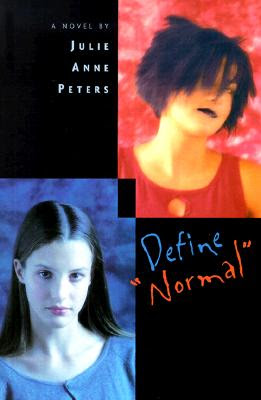Okay, so I can’t sleep. And I’ve always wanted to write unofficial reviews of bad books. So naturally, 2:30 in the morning is the perfect time to put together a little rant about one book in particular that has always bothered me; and hey, this may become A Thing. I’m going to say, right up front, that I’m kind of a book snob. Sorry.
So for my Bad Book Review #1, I will tell you exactly what bothers me about Define “Normal”, by Julie Anne Peters. (Hey, this is like a middle school book report, only…better?)
Now to be fair, this isn’t a bad book. It’s your typical going-through-middle-school/uncovering-facades-type young person novel, and it touches on some dark topics like depression, abandonment, etc. Then again the characters use slang like “cronk” and “bode” unironically, so I guess you win some and you lose some. However, I did actually read this several times in my youth because it’s fairly enjoyable reading, except for one thing which has always really bothered me.
One of the main characters, a punk-type girl with a prickly exterior, is secretly a budding concert pianist. So as it stands, classical piano is an important element in this book. The problem is I don’t think the author knows anything about classical piano.
Let’s establish some facts here. Our thirteen-year-old quasi-heroine (who goes by “Jazz”) tells the protagonist that she wants to go to Juilliard. Great! Juilliard is one of the most prestigious conservatories in the world (with its latest acceptance rate at 5.5%), so good for you!
But hold on for a minute. If you want to have the remotest chance of getting in to Juilliard, you have to be brain-smackingly good. So this is where it all falls apart.
One piece that Jazz plays, which astounds the main character, is Bach’s Minuet in G.
This is the piece that every six-year-old plays once they learn how to read notes. But let’s give the author the benefit of the doubt; maybe this is some obscure Minuet in G that is really difficult. The best I could think of was maybe a minuet from one of the partitas, and there is indeed a movement marked Tempo di Minuetta from his G Major Partita.
But why would someone learn a tiny part of a partita and not learn the whole thing? It’s like if Justin Bieber only performed one stanza of “Baby” at each of his concerts. So I’m going to have to assume that Jazz is indeed playing a piece most often played by babies. And she wants to go to Juilliard. Well, okay. Nothing wrong with dreaming big!
Next, Jazz entrances people with her rendition of Debussy’s “Prelude to the Afternoon of a Fawn.” The author describes how our pianist’s rendering of the piece is so expressively powerful that the protagonist can clearly see a baby fawn frolicking with mama deer.
A few problems.
1. Debussy’s Prélude à l’après-midi d’un faune is an orchestral piece. (There is a version arranged for solo piano, but it wasn’t by Debussy.)
2. It’s “Prelude to the Afternoon of a Faun,” not “Fawn.” It’s all well and good that the main character can see the baby fawn so clearly, but this isn’t just a matter of spelling. Prélude à l’après-midi d’un faune is not about frolicking fawns, it’s about a mythological goat-creature trying to have sex with nymphs.
Well, maybe Jazz’s repertoire is just very creatively constructed. The glowing jewel of her repertoire though, which she was slated to play at a competition in the book, is Chopin’s Polonaise.
But wait, which one? There are at least twenty-three polonaises by Chopin. Was it the one he wrote when he was seven? Or the Polonaise-Fantasie? All we are told is that Jazz struggles with it, which isn’t surprising if 1/3 of her repertoire is a piece played by the post-toddler set.
In a piano lesson, Jazz’s teacher tells her that the Bach and Debussy are “perfect,” but the Chopin is not quite there. And that’s it. He doesn’t tell her if it’s an issue with her technique, or expressiveness, or if she’s muddying the harmonies with the pedal, or needs to improve the clarity of the melody, or what. He just tells her it’s almost there, and leaves. If only I could get away with teaching like that! “Yeah, this one thing is perfect, and that one thing isn’t. That’ll be a hundred dollars.”
Look, I realize that music isn’t the center of your novel, and you might not have been counting on a book about an aspiring concert pianist to be read by…an aspiring concert pianist. But it doesn’t hurt to do a little bit of research. College students do it all the time.

Leave a Reply